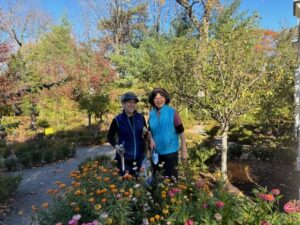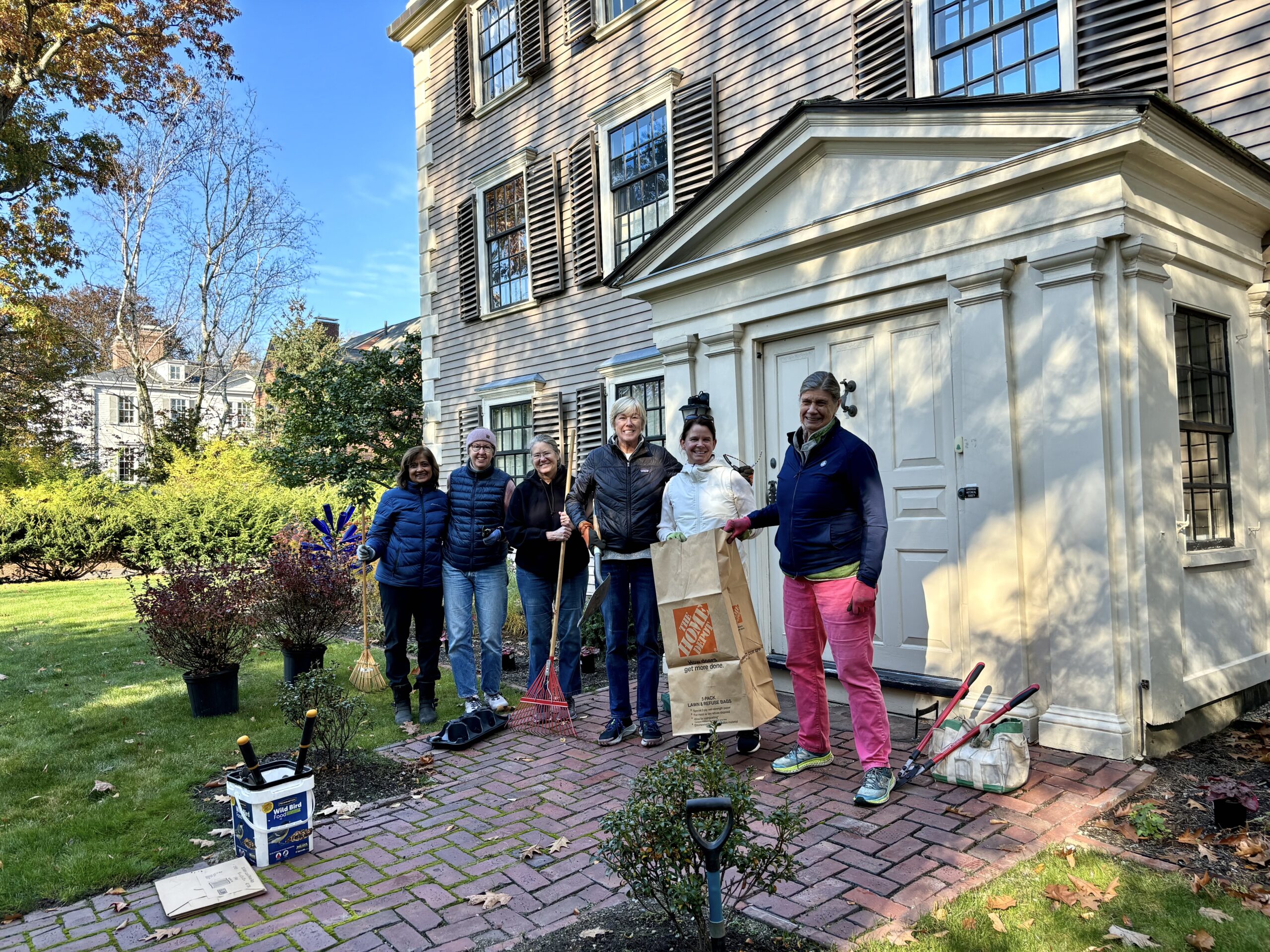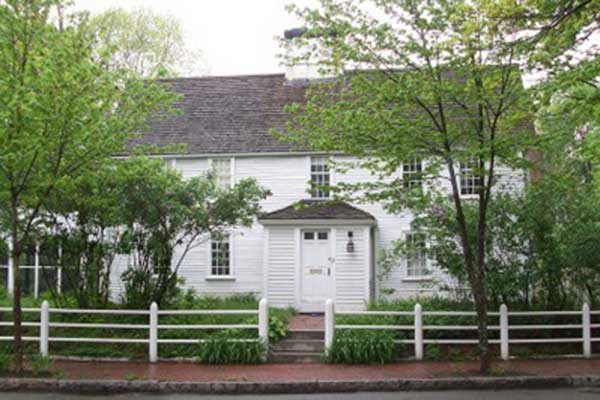Cambridge is home to many historic properties and the organizations who own and administer them, and many conservation organizations and social programs have formed in the City’s fertile soil. CP&GC has long supported these differing groups with many levels of support including design input, plant material, and hands-on gardening.
Longfellow-Washington’s Headquarters National Historic Site

CP&GC embarked on a 1967 restoration of the garden accompanied by a major fund raising effort, before this historic site was conveyed to the National Park Service in 1973. The club has continued to contribute to the care of the garden with both hands-on assistance and funding. Most recently, members have volunteered their time to dead-heading the profusion of lilacs that bloom each spring and adding bulbs to the formal garden begs to amplify the already stunning display.
In 2008, CP&GC began a multi-year study of the prominent Linden on the house’s east lawn, including efforts to propagate it. The Linden (discovered to be a Littleleaf linden) is believed to have been planted in the early 1800s. Two scions of the “Longfellow Linden” live on at the Cooper-Frost-Austin House (the oldest house on Cambridge) and in Mount Auburn Cemetery, near Longfellow’s grave.
Charles River Conservancy
 In 1993 CP&GC hosted a symposium on critical issues facing the Charles River. The seeds planted then lead CP&GC member Renata von Tscharner to the 2000 founding of the Charles River Conservancy. The Conservancy continues to thrive under new director Laura Jasinski, and continues CRC’s mission to strive “to make the Charles River and its parks a well-maintained network of natural urban places that invite and engage all in their use and stewardship.” CP&GC has collaborated on multiple projects with the Conservancy, most recently working toward reclamation of the river bank at Hell’s Half Acre. Photo by Aaron Bourque, courtesy Charles River Conservancy
In 1993 CP&GC hosted a symposium on critical issues facing the Charles River. The seeds planted then lead CP&GC member Renata von Tscharner to the 2000 founding of the Charles River Conservancy. The Conservancy continues to thrive under new director Laura Jasinski, and continues CRC’s mission to strive “to make the Charles River and its parks a well-maintained network of natural urban places that invite and engage all in their use and stewardship.” CP&GC has collaborated on multiple projects with the Conservancy, most recently working toward reclamation of the river bank at Hell’s Half Acre. Photo by Aaron Bourque, courtesy Charles River Conservancy
History Cambridge Hooper-Lee-Nichols House
 In 1962, soon after the c. 1685 Hooper-Lee-Nichols House was bequested to History Cambridge (formerly the Cambridge Historical Society) the Garden Club began its efforts by designing a simple landscape plan as a miniature representation of the estate that once surrounded the house. One of the garden’s most significant features – the yew hedges – go back to the original Garden Club plan.
In 1962, soon after the c. 1685 Hooper-Lee-Nichols House was bequested to History Cambridge (formerly the Cambridge Historical Society) the Garden Club began its efforts by designing a simple landscape plan as a miniature representation of the estate that once surrounded the house. One of the garden’s most significant features – the yew hedges – go back to the original Garden Club plan.
CP&GC has long worked at the site on many elements of the gardens: donating and planting trees, renovating the c. 1916 Colonial Revival fence and front gate, planting thousands of spring bulbs, restoring the garden’s grape trellis, managing lawn care, completing myriad spring and fall garden clean ups, and funding pruning.
The second oldest house in Cambridge and is home to History Cambridge, a private nonprofit dedicated to sharing the stories of Cambridge and its residents. The garden has been a featured component of events, such as the “Forgotten Souls of Tory Row” art installation in 2022.
On The Rise
On The Rise is a day program in mid-Cambridge that provides safety, community, and advocacy for homeless and formerly homeless women. On The Rise occupies what was once a single-family home on Broadway, and its south-facing garden has been half-designed and half-implemented, while a frequently used portion of it languishes. CP&GC is committed to working with the program leadership to brainstorm improvements for the “second half” of the garden and provide help with ongoing maintenance.
Cooper-Frost-Austin House
 Cooper-Frost-Austin House is the oldest house in Cambridge and owned by Historic New England. Beginning in 2015, a group of CP&GC gardeners began hands-on work – weeding, bulb-planting, planting (including a CP&GC propagated Linden), and pruning. CP&GC members have provided hands-on work at the site, including installing and planting containers, weeding, watering, hundreds of Spring bulbs and other plant material to stabilize the front bank.
Cooper-Frost-Austin House is the oldest house in Cambridge and owned by Historic New England. Beginning in 2015, a group of CP&GC gardeners began hands-on work – weeding, bulb-planting, planting (including a CP&GC propagated Linden), and pruning. CP&GC members have provided hands-on work at the site, including installing and planting containers, weeding, watering, hundreds of Spring bulbs and other plant material to stabilize the front bank.
Cambridge Community Center
 Located off Putnam Avenue, the Cambridge Community Center has been serving children, youth, and families throughout Cambridge for over 90 years. CP&GC has been long been active here where the club created hands-on gardening programs starting in 1936. We have connected with the Center throughout many decades and look forward to working with them in the future as CCC works to accomplish a restoration and an addition to the building.
Located off Putnam Avenue, the Cambridge Community Center has been serving children, youth, and families throughout Cambridge for over 90 years. CP&GC has been long been active here where the club created hands-on gardening programs starting in 1936. We have connected with the Center throughout many decades and look forward to working with them in the future as CCC works to accomplish a restoration and an addition to the building.
